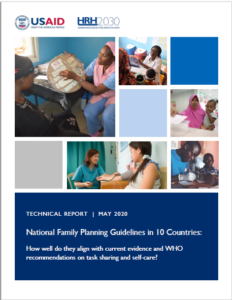14 May National Family Planning Guidelines in 10 Countries: How they align with current evidence and WHO recommendations on task sharing and self-care
 Many in the international family planning community are concerned with reducing unnecessary medical barriers to contraception, which impede access and undermine women and couples’ rights. USAID and its implementing partners have been researching and working to reduce unnecessary medical barriers for decades. To improve access to contraceptives, efforts need to include expanding the cadres authorized, empowered, and trained to provide quality family planning services (task sharing), and deregulation of hormonal contraceptives to promote client empowerment and self-care wherever possible.
Many in the international family planning community are concerned with reducing unnecessary medical barriers to contraception, which impede access and undermine women and couples’ rights. USAID and its implementing partners have been researching and working to reduce unnecessary medical barriers for decades. To improve access to contraceptives, efforts need to include expanding the cadres authorized, empowered, and trained to provide quality family planning services (task sharing), and deregulation of hormonal contraceptives to promote client empowerment and self-care wherever possible.
Starting in 2012, the World Health Organization (WHO) has released a series of publications geared to optimizing health worker roles to improve access to maternal health care, including family planning services, that provide guidance on task shifting, task sharing, and self-care approaches. The growing body of evidence and international guidance promoting the expansion of cadres that can provide family planning services has led some countries to adopt various task sharing policies to increase FP access and streamline responsibilities among various health worker cadres. But these approaches can be controversial at the country level.
This report documents the extent to which 10 countries have adopted policies, service delivery guidelines, or other government documents in line with current scientific evidence and WHO guidelines on task sharing the provision of methods to mid- and lower-level cadres, and promotion of self-care. In addition, the report identifies areas where national family planning guidelines remain behind current evidence, and highlights opportunities for advocacy and policy change at the country level to further reduce medical barriers and ultimately increase people’s access to family planning.
The full report (shown above) and a two-page summary are available for download, below.
DOWNLOAD FULL REPORT DOWNLOAD BRIEF
Country: Global
Resource Type: Report
Topic: Task sharing





